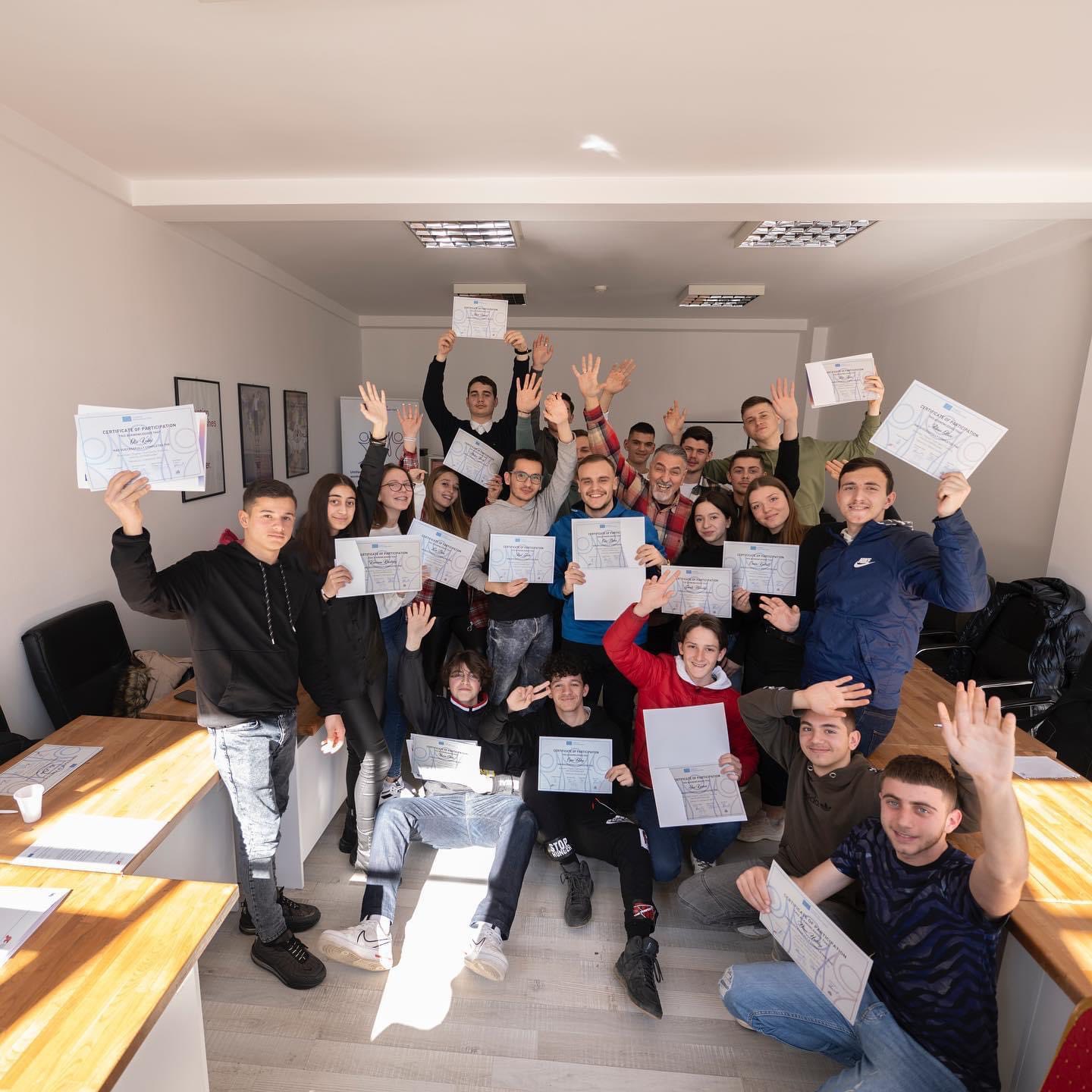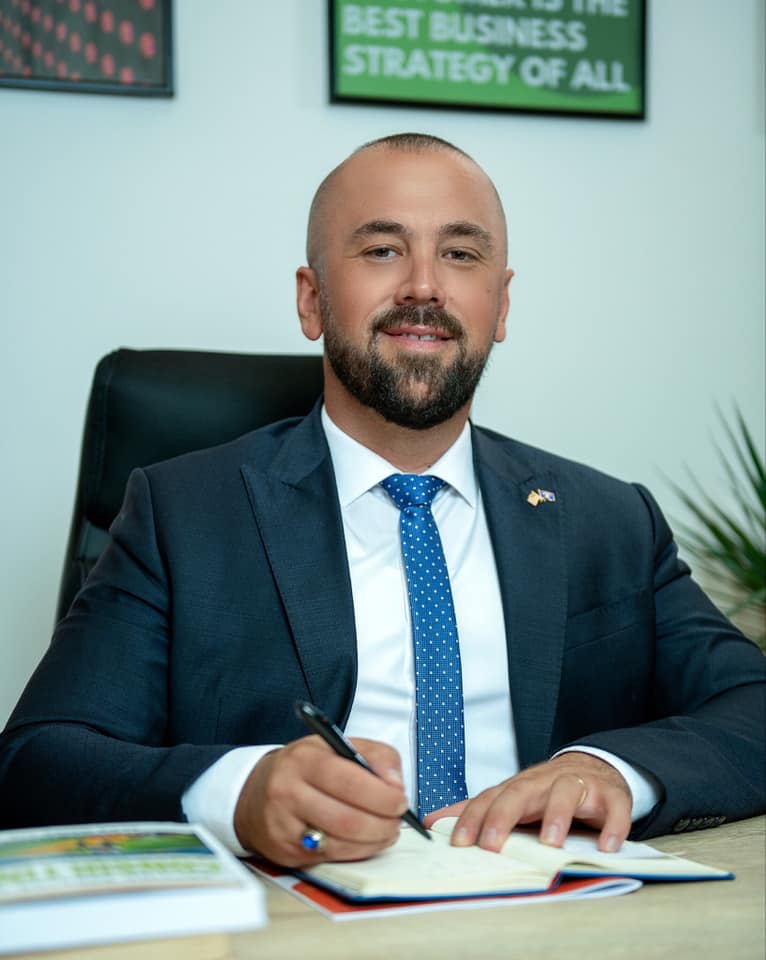
Kosovo is facing a great demand for skilled workers ready to work in person or remotely for the rest of the world. Grasping new opportunities enabled by the green and digital transition can be found in the lifelong learning and skills development of these. Similar gaps amongst the skill force are present in the EU area, where the European Commission (EC) declared 2023 the European Year of Skills. The goal is to provide citizens with the relevant skills to adjust to labour market changes.
“There is a great skills gap in Kosovo’s labour market that has only grown deeper after the pandemic.”
Fatos Axhemi, Jakova Innovacion Centre
Making a more significant impact in smaller towns
The labour market in Kosovo faces multi-faceted challenges, but in smaller towns, there are even fewer opportunities for employers and employees. Topping the list of problems is the skills gap: businesses don’t find the workers they need, while those searching for a job are not qualified enough to get employed. In the western town of Gjakova, the Jakova Innovation Centre (JIC) identified a great potential to address the mismatch of labour needs and education skills. This phenomenon is likely contributing to the unemployment of more than half of young people in Kosovo.
“There is a great skills gap in Kosovo’s labour market that has only grown deeper after the pandemic,” says Fatos Axhemi, the project manager of a co-funded project between the European Union and the Municipality of Gjakova addressing employability of the youth, women, and disadvantaged groups.
To tackle the issue, JIC applied a two-way approach: working with the employer and the job seekers. After listing potential private and public sector opportunities, they identified eight in-demand skills through a labour market analysis and needs assessment—the result: 31 employed and over a hundred completed internships.
“Our methods to engage young people in the labour market proved successful, for which we had very positive reviews,” says Axhemi. “They have completed an internship where they carried the weight of work on their shoulders, carried professional duties based on what they are skilled to do.”
In addition to training, participants grew during their experience with the mentorship programme during the two-year project.

“We have laid the foundations of a great network of existing and new businesses operating in Gjakova, who are continuing to identify the skills shortages to the public authorities actively, which adds to our achievements as a project.”
Fatos Axhemi, Jakova Innovacion Centre
Start-ups, getting over the first hurdle
JIC also supported start-up businesses that needed help to get over the start line, especially those operating in small-town environments like Gjakova and the neighbouring municipalities of Junik and Deçan. Among the 16 grantees, the project supported women entrepreneurs and start-up owners with a disability in various industries, such as food processing, IT, nutrition consultancy, business growth, and many more.
“We have laid the foundations of a great network of existing and new businesses operating in Gjakova, who are continuing to identify the skills shortages to the public authorities actively, which adds to our achievements as a project,” says Axhemi.
Continuous identification and addressing of skills shortage is a must for all actors, as is the need for lifelong learning and acquiring skills to fit with transitions that increase everyone’s chances of employability. More than three-quarters of companies in the EU have difficulties finding workers with the necessary skills, and only a third of adults undertake training, the EC says.
About the project
As a lead partner, Jakova Innovation Centre and Municipality of Gjakova implemented the project “United towards empowering youth, women and disadvantaged groups” over two years, funded by the European Union Office in Kosovo. The main aim of the project was to analyse the current labour market and create new opportunities for youth, women, and disadvantaged groups. Additionally, the project aimed to provide the target groups with the necessary skills needed for the labour market, connecting and match-making employers with employees for on-job training, internships, and regular employment and financing new innovative ideas for creating new start-ups.
Photo credits: Jakova Innovation Centre
Making a more significant impact in smaller towns
The labour market in Kosovo faces multi-faceted challenges, but in smaller towns, there are even fewer opportunities for employers and employees. Topping the list of problems is the skills gap: businesses don’t find the workers they need, while those searching for a job are not qualified enough to get employed. In the western town of Gjakova, the Jakova Innovation Centre (JIC) identified a great potential to address the mismatch of labour needs and education skills. This phenomenon is likely contributing to the unemployment of more than half of young people in Kosovo.
“There is a great skills gap in Kosovo’s labour market that has only grown deeper after the pandemic,” says Fatos Axhemi, the project manager of a co-funded project between the European Union and the Municipality of Gjakova addressing employability of the youth, women, and disadvantaged groups.
To tackle the issue, JIC applied a two-way approach: working with the employer and the job seekers. After listing potential private and public sector opportunities, they identified eight in-demand skills through a labour market analysis and needs assessment—the result: 31 employed and over a hundred completed internships.
“Our methods to engage young people in the labour market proved successful, for which we had very positive reviews,” says Axhemi. “They have completed an internship where they carried the weight of work on their shoulders, carried professional duties based on what they are skilled to do.”
In addition to training, participants grew during their experience with the mentorship programme during the two-year project.

Start-ups, getting over the first hurdle
JIC also supported start-up businesses that needed help to get over the start line, especially those operating in small-town environments like Gjakova and the neighbouring municipalities of Junik and Deçan. Among the 16 grantees, the project supported women entrepreneurs and start-up owners with a disability in various industries, such as food processing, IT, nutrition consultancy, business growth, and many more.
“We have laid the foundations of a great network of existing and new businesses operating in Gjakova, who are continuing to identify the skills shortages to the public authorities actively, which adds to our achievements as a project,” says Axhemi.
Continuous identification and addressing of skills shortage is a must for all actors, as is the need for lifelong learning and acquiring skills to fit with transitions that increase everyone’s chances of employability. More than three-quarters of companies in the EU have difficulties finding workers with the necessary skills, and only a third of adults undertake training, the EC says.
About the project
As a lead partner, Jakova Innovation Centre and Municipality of Gjakova implemented the project “United towards empowering youth, women and disadvantaged groups” over two years, funded by the European Union Office in Kosovo. The main aim of the project was to analyse the current labour market and create new opportunities for youth, women, and disadvantaged groups. Additionally, the project aimed to provide the target groups with the necessary skills needed for the labour market, connecting and match-making employers with employees for on-job training, internships, and regular employment and financing new innovative ideas for creating new start-ups.
Photo credits: Jakova Innovation Centre
Please wait while your video is being uploaded...
Don't close this window!